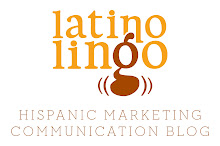FTC takes translation route in "educating" Hispanics on financial issues
The Federal Trade Commission recently announced the creation of a new microsite called "Money Matters" that it also offers in Spanish as "Asuntos de Dinero." Pitched by their agency as "important to provide (Hispanics) with smart money management techniques. Hispanic consumers are a powerful economic force, and like all consumers, they need access to practical and reliable financial literacy resources" a review of the Spanish-language site shows it is essentially a literal translation of the English site.
Money is green and a translation shouldn't matter, right? Wrong. Research clearly shows the Hispanics (along with African Americans) have among the lowest saving and investment rates of any demographic. 56% of Hispanics have never had a bank account, according to Simmons, Inc. Socio-economic reasons alone do not explain this phenomenon, and Hispanics continue to have among the highest rates of discretionary income.
What does help explain this phenomenon in a larger part is Hispanics' relationships (or lack of)with financial services institutions, and the role that culture plays. Whether it's coming from countries where there is inherent distrust of financial institutions, perceived racism (and certainly plenty of examples of real racism) or other reasons, there are other reasons besides lack of basic money management skills that contribute to this. In addition, the AHAA Latino Identity Study points to other reasons such as our interpersonal orientation, fatalism, and perception of time and space as areas that need to be addressed in marketing financial services.
These factors and the inherent conflicts they often cause within Hispanics need to be addressed in copy aimed at Spanish-dominant Hispanics. If that's not enough, the recent AOL Cyberstudy pointed out that Hispanics recognize the disparity between the availability of English and Spanish-language content. They perceive English sites as more comprehensive in part because they know the Spanish content is not. Further, the study showed that Hispanics often prefer English content and mistrust Spanish content because Spanish-language sites are often little more than literal translations of English content. In fact, only 3% of respondents found Spanish sites more trustworthy and useful than those in Spanish.
BTW, I tried twice to reach the FTC's agency contact at Fleishman-Hillard to ask about the strategy in creating a translated site with no response.
Money is green and a translation shouldn't matter, right? Wrong. Research clearly shows the Hispanics (along with African Americans) have among the lowest saving and investment rates of any demographic. 56% of Hispanics have never had a bank account, according to Simmons, Inc. Socio-economic reasons alone do not explain this phenomenon, and Hispanics continue to have among the highest rates of discretionary income.
What does help explain this phenomenon in a larger part is Hispanics' relationships (or lack of)with financial services institutions, and the role that culture plays. Whether it's coming from countries where there is inherent distrust of financial institutions, perceived racism (and certainly plenty of examples of real racism) or other reasons, there are other reasons besides lack of basic money management skills that contribute to this. In addition, the AHAA Latino Identity Study points to other reasons such as our interpersonal orientation, fatalism, and perception of time and space as areas that need to be addressed in marketing financial services.
These factors and the inherent conflicts they often cause within Hispanics need to be addressed in copy aimed at Spanish-dominant Hispanics. If that's not enough, the recent AOL Cyberstudy pointed out that Hispanics recognize the disparity between the availability of English and Spanish-language content. They perceive English sites as more comprehensive in part because they know the Spanish content is not. Further, the study showed that Hispanics often prefer English content and mistrust Spanish content because Spanish-language sites are often little more than literal translations of English content. In fact, only 3% of respondents found Spanish sites more trustworthy and useful than those in Spanish.
BTW, I tried twice to reach the FTC's agency contact at Fleishman-Hillard to ask about the strategy in creating a translated site with no response.
Labels: AHAA, Hispanic disparity, Hispanic Internet, Latino Cultural Identity


0 Comments:
Post a Comment
Subscribe to Post Comments [Atom]
<< Home